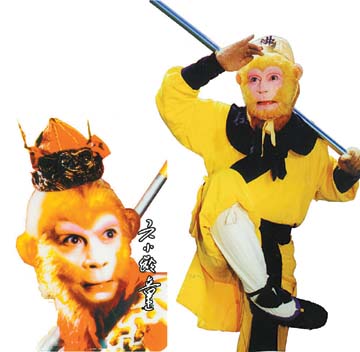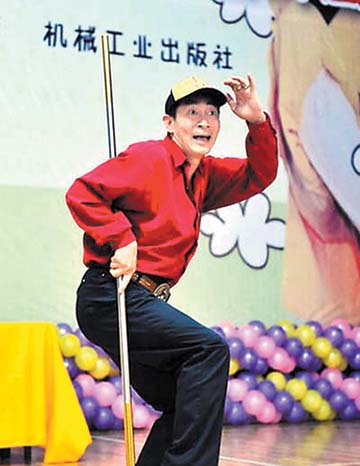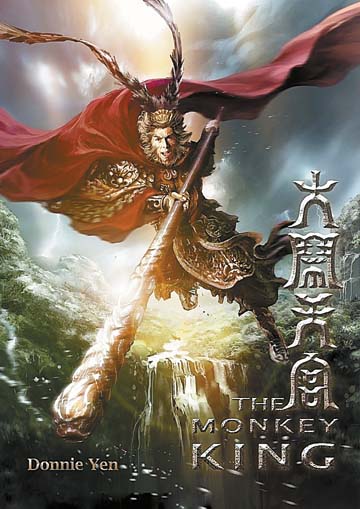 GENERATIONS of Chinese grew up under the spell cast by Wu Cheng’en’s “Journey to the West,” the 16th-century adventure novel. Hopes are that the tale will continue to leave audiences spellbound, as veteran mainland actor Zhang Jinlai, best known for his role as the Monkey King in the 1986 TV series “Journey to the West,” said last month that he will fly to the United States in June to discuss a film adaptation. Meanwhile, more productions are wrapped on actor/director Stephen Chow’s version of the tale and another starring Chow Yun-fat. Lauded as one of China’s “Four Great Classical Novels,” it has inspired operas, including one penned by acclaimed British rocker Damon Albarn, a string of cinema hits dating back to the 1940s and a popular online game. The story is based on the legend of the monk Xuanzang’s journey to India during the Tang Dynasty (618-907) to retrieve sacred texts. The monk is ordered on this quest towards spiritual enlightenment by Buddha and is placed under the protection of three disciples — the Monkey King, Zhu Bajie and Sha Wujing — who are making up for past sins as well as a dragon prince who comes in the form of a horse. The story first appeared on the big screen in the 1940s and has since been used as the basis for such hits as “Monkey Goes West” (1966) and the Jet Li-starring “The Forbidden Kingdom” (2008) as well as Stephen Chow’s own “A Chinese Odyssey” parts one and two (1994). It has also been retold in a number of television productions — most notably Zhang’s 1986 TV series directed and produced by China Central Television, which was then dubbed and screened around the world.  Zhang’s family members, who are Beijing opera actors, specialized in playing the role of the Monkey King. His compelling performance, which was greatly praised by critics, helped him win the best actor award at the sixth Golden Eagle Awards in 1988. During the past 30 years, apart from playing other roles, Zhang mostly focuses on promoting monkey culture. Recently he said he will talk to Hollywood moguls James Cameron and Steven Spielberg about a film adaptation. The 53-year-old actor said the project has been in the pipeline for more than five years, although he expressed his dissatisfaction with the efforts of domestic script writers. “Some scripts are ridiculous! I want to find an American script writer to rewrite it,” he said, explaining that he wanted a script with a more international flavor and appeal. Zhang said there was a possibility the film could be shot in 3D, but he emphasized that the most important task is to retain the essential aspect of Chinese culture, which is the story’s foundation. Zhang said that he would star in the new film, despite his age, adding that some of the film’s other roles could be filled by an international cast. “For me, it is OK if an Indian actor plays the Buddha,” he said. As China’s rapidly expanding film industry continues to break new commercial ground, Chinese filmmakers are increasingly looking to literary adaptations for their inspiration — with “Journey to the West” a time-honored favorite. “‘Journey to the West’ is a story full of imagination,” said Stephen Chow. The Hong Kong star said his plot is beyond any other fantasy. He is putting final touches to his 110 million yuan (US$17.3 million) adaptation, whose working title is “Journey to the West” and stars Chinese actors Wen Zhang and Shu Qi. It will be the third time he has used it as source material for a film. It will come up against another version featuring heavyweights Chow Yun-fat and Donnie Yen in the Soi Cheang-directed 3D epic “The Monkey King,” costing an estimated 400 million yuan and which is also in post-production. Chow Yun-fat’s fascination with the ancient text was first fuelled 30 years ago when he watched a grainy, black-and-white Cantonese film version of the tale at his local cinema.  “I think the reason it is still relevant nowadays — and people still find it attractive — is all down to its imagination. Until now I still don’t see it being surpassed.” It is the sheer scale of the source material available in the original text that has Chow Yun-fat returning to those pages once again. “The story is so creative. Yet it is so well-arranged and structured. On the one hand the creative process is just as free as a bird but on the other hand the framework of the story is very well organized. This is unique.” Kat Yeung, distribution executive at Filmko Films which is co-producing rival movie “The Monkey King” along with Mandarin Films, believes the lessons learned along the way by those characters still resonate centuries on. Hong Kong-based film critic and historian Paul Fonoroff also believes its enduring success comes down to its universal themes. “It’s a tale that has something for everybody: fantasy, adventure, cartoonish characters for the kids, an allegorical subtext for the adults, underlying themes of Buddhist enlightenment for the more spiritually inclined, and plenty of sex or at least sexual innuendo, depending on how the filmmakers want to play it,” he explains. “The story’s themes are timeless and have a resonance regardless of one’s cultural background — think ‘Wizard of Oz’ multiplied a thousand times. And with characters like a monkey, pig, a dragon, it’s not only loads of fun but — equally important for 21st-century filmmakers — it’s a synergistic marketing dream.” China is cementing its status as a cinema powerhouse. Box-office takings surged 30 percent year-on-year in 2011, eclipsing those in North America. With the government-enforced quota of just 20 international films allowed in for screening each year still in place, it’s an industry in need of productions and ideas, with “Journey to the West” seen as a rich source for inspiration.(SD-Agencies) | 
